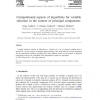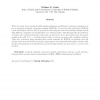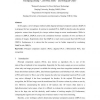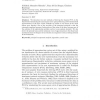287 search results - page 8 / 58 » Optimal Solutions for Sparse Principal Component Analysis |
144
Voted
CSDA
2004
15 years 1 months ago
2004
Variable selection consists in identifying a k-subset of a set of original variables that is optimal for a given criterion of adequate approximation to the whole data set. Several...
137
click to vote
IJCNN
2006
IEEE
15 years 8 months ago
2006
IEEE
With very noisy data, having plentiful samples eliminates overfitting in nonlinear regression, but not in nonlinear principal component analysis (NLPCA). To overcome this problem...
PR
2006
15 years 1 months ago
2006
In this paper, a novel subspace method called diagonal principal component analysis (DiaPCA) is proposed for face recognition. In contrast to standard PCA, DiaPCA directly seeks t...
192
Voted
ICML
2004
IEEE
16 years 2 months ago
2004
IEEE
Principal component analysis (PCA) is a widely used statistical technique for unsupervised dimension reduction. K-means clustering is a commonly used data clustering for unsupervi...
85
Voted
NPL
2008
15 years 1 months ago
2008
We introduce two new methods of deriving the classical PCA in the framework of minimizing the mean square error upon performing a lower-dimensional approximation of the data. These...




